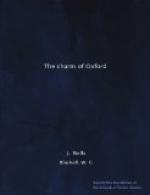“Shall Brasenose, therefore,
fail to hold her own?
She nerves herself,
anew, for coming strife,
Her vigorous pulses
beat with strength and life.
Courage, my brothers!
Troubles past forget!
On to fresh deeds! the
gods love Brasenose yet.”
CORPUS CHRISTI COLLEGE
“But still the old quadrangle
keeps the same,
The pelican is here;
Ancestral genius of the place, whose name
All Corpus men revere.”
J. J. C., in “The Pelican Record,”
1700.
[Plate XVI. Corpus Christi College : The First Quadrangle]
Corpus is emphatically, before all other colleges in Oxford, the college of the Revival of Learning; its very foundation marked the change from the old order of things to the new. Its Founder, Bishop Foxe, of Winchester, was one of the great statesman-prelates to whom mediaeval England owed so much, and he had a leading share in arranging the two royal marriages which so profoundly affected the history of our country, that of Henry VII’s daughter, Margaret, with the King of Scotland, and that of his son, afterwards Henry VIII, with Catharine of Aragon.
After a life spent “in the service of God” “in the State,” rather than “in the Church,” Foxe resolved to devote some of his great wealth to a foundation for the strengthening of the Church. His first intention was to found a college for monks, but, fortunately for his memory and for Oxford, he followed the advice of his friend, Bishop Oldham, of Exeter, who told him, in words truly prophetic, that the days of monasteries were past: “What, my lord, shall we build housed for a company of buzzing monks, whose end and fall we ourselves may live to see? No, no, it is more meet a great deal that we should have care to provide for the increase of learning.” In the next generation the monasteries were all swept away, while Foxe’s College remains a monument of the Founder’s pious liberality and of his friend’s wise prescience.
Corpus was the first institution in England where definite provision was made for a teacher of the Greek Language, and Erasmus hailed it with enthusiasm; in a letter to the first President of the new college, he definitely contrasts the conciliatory methods of Reformers in England with the more violent methods of those in Germany, and counts Foxe’s foundation, which he compares to the Pyramids of Egypt or the Colossus of Rhodes, among “the chief glories of Britain.”
Foxe, however, did not confine his benefactions to classical studies, important as these were. He imported a German to teach his scholars mathematics, and the scientific tastes of his students are well illustrated by the picturesque and curious dial, still in the centre of his College Quad, which was constructed by one of them in the reign of Elizabeth. It is well shown in our picture, as are also Foxe’s charming low buildings, almost unaltered since the time of their Founder.




